A Conversation With Jayne Ann Krentz
by Claire E. White
As a little girl, she loved to read adventure stories, such as The Black Stallion by Walter Farley,
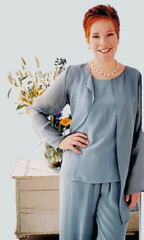
|
After earning a B.A. in history from the University of California at Santa Cruz, Jayne went on to obtain a master's degree in library science from San Jose State University. Before she began writing full-time, she worked as a librarian in both academic and corporate libraries, including the Duke University library. It took a grueling six years of publisher rejections before her first novel was published. But with the tenacity and good humor for which she is known, she persevered with her writing. Her work habits are legendary; she writes every work day, starting at 7:00 a.m., describing her writing as a compulsion.
In addition to her fiction writing, she is the editor of, and a contributor to a nonfiction essay collection, Dangerous Men and Adventurous Women: Romance Writers on the Appeal of the Romance, published by the University of Pennsylvania Press. The book received the Susan Koppelman Award for feminist studies given by the Women's Caucus of the Popular Culture Association and the American Culture Association. She is an ardent proponent of popular fiction, including romance novels, and is quick to defend the genre against critics. She says, "Literary critics often criticize popular fiction -- romance in particular -- because it is not 'realistic'. But that is a ludicrous criticism which completely misses the point. It is not the task of popular fiction to be realistic. It may feel realistic upon occasion…. Popular fiction encapsulates and reinforces many of our most fundamental cultural values. Romance is among the most enduring because it addresses the values of family and human emotional bonds."
Although she is reluctant to speak much about it, she has generously shared the profits of her phenomenal success. She established the Castle Humanities Fund at UCSC's University Library, enabling the library to acquire books that it would not otherwise be able to purchase. She has also donated generously to many charities and causes, including buying books for libraries at 15 Seattle elementary schools which simply did not have the funds in order to get good books into students' hands.
Married to the love of her life, Frank Krentz, for over thirty years, she and her husband live in Seattle, Washington. Jayne's outside interests include vegetarian cooking and participation on the Advisory Board for the Writers Programs at the University of Washington extension program.
She talks with us about her newest novel, Light in Shadow (Putnam), her love for libraries and shares the secrets which kept her going during those long six years before her first novel was published.
What books did you like to read when you were growing up? Was there anyone in particular who encouraged you to read?
My formative reading consisted primarily of Walter Farley horse stories and Nancy Drew. I then moved on to the early Robert Heinlein. The influence of those books is clear in my work: I now write romantic-suspense, often with a psychic twist and a dog.
What kept you going during the years before your first novel was accepted for publication? What kept you from giving up?
Writing, for me, is an addiction; a compulsion; an obsession. I couldn't give it up no matter how hard I tried -- and believe me, I did try on several occasions during the six long years it took me to get published. I think that if you can walk away from your writing, you are probably not fated to be a writer. If you keep going back to it regardless of all the rejections, you're doomed to be one.
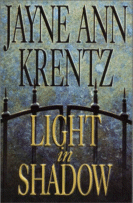
|
Light in Shadow contains all of the elements that I love to work with: romance, suspense, a lot of family stuff, some humor and a psychic twist.
The heroine of the book is Zoe Luce, who has some unusual skills and some dangerous secrets from her past. What was the greatest challenge you faced in writing Zoe?
Zoe was committed against her will to a very private psychiatric asylum because her in-laws wanted her out of the way. The scenes in which Zoe dreams about her time in the asylum -- a place she calls Xanadu -- creeped me out, to be honest.
The hero of the book is private investigator Ethan Truax, who has already been married and divorced three times. Although there's a good explanation for his failed marriages, it seems an unusual choice for a hero. What went into your decision to give Ethan so much marital baggage? I thought it worked very well, and I've never seen it done in a romance novel.
The heroine, Zoe, has a lot of baggage in this story. I wanted to pair her with a hero who had an equally troubled past. They've got other problems, too. Zoe is psychic and Ethan thinks all psychics are charlatans and frauds. Also, Zoe is an interior designer. Ethan once had a very bad experience with a decorator. It warped his view of the profession something fierce.
Your latest Regency-era book is Don't Look Back, which features Lavinia Lake and Tobias March, private investigators to the wealthy and titled. Don't Look Back has such wonderful repartee -- how did you develop your ear for dialogue?
| "Most modern literary critics are stuck in a time warp that dates back to the middle of the twentieth century when the only fiction that was considered good fiction was that which was heavily influenced by existentialism, various social agendas and psychological theory." |
What are your thoughts on love scenes in romance novels? Do you find them challenging to write? What turns you off about a love scene in a book you are reading?
Love scenes are as natural and as important in a romance novel as scenes of violence are in a novel of suspense. Yes, you can write a romance without a love scene just as you can write a suspense novel without any violence, but in both cases the story will lack a certain cathartic energy.
What are your pet peeves when reading romance novels?
I don't have any pet peeves. All I want is a good story told with a strong voice and a compelling vision.
How do you approach the research needed to write your historical novels?
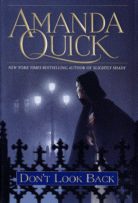
|
Would you take us through a typical writing day for you?
I'm a morning person. That says it all, as far as my routine is concerned. I write five or six days a week (seven when I'm nearing the end of a book). A typical day for me means that I am at the computer by seven o'clock and I stay there until noon. The afternoons are spent doing research or, better yet, shopping at Nordstroms. Evenings, I make notes for the next day's writing. When I'm working on a book, I can't walk away from it.
When you start a new book, how much of the plot do you know in advance? Do you use outlines?
I have learned the hard way that no matter how detailed the outline, I will toss it aside after I am about three chapters into the story. Unfortunately, I get all my good ideas half way through a book rather than up front when it would be much more useful! The result is that I usually start with a very rough, handwritten outline that is a couple of pages long. It contains a couple of key elements of the plot and some details about the action that will take place in the first thirty or forty pages. That's about it.
Although romance remains the most popular genre of books sold in America, it is still viewed with disdain from so-called "literary" critics, who (quite unfairly) question its value as a valid art form. Why do you think this is true?
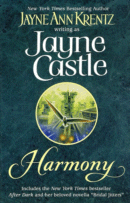
|
The thing is, romance novels, like the other genres of popular fiction, descend from a different storytelling tradition -- the heroic tradition. They feature the ancient heroic virtues: honor, courage, determination and the healing power of love. Most modern literary critics are stuck in a time warp that dates back to the middle of the twentieth century when the only fiction that was considered GOOD fiction was that which was heavily influenced by existentialism, various social agendas and psychological theory.
How do you feel about ebooks? In 5 years, will your fans be reading your books on an electronic reader instead of on paper?
I'm sure we will see many experiments in formats in the years ahead but I've got a hunch that it will be a long time, if ever, before we ever replace books. A book is, in many ways, the perfect format, if for no other reason than that it is a low tech format that does not require any high-tech equipment to access. Besides, books are attractive and they feel good in the hand.
What would you say are some recurring themes that surface in your work?
No matter what I write, I always find myself going back to a few themes that have been present in my work from the very start: Honor, trust and family.
What is your advice to aspiring novelists who may be feeling a bit rejected early in their careers?
This is one business in which perseverance pays.
What are some of the challenges that libraries are facing today? What can people do to help support their local libraries? Why are libraries important?
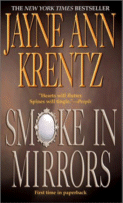
|
A society is only as strong as its values and those are passed down to future generations through popular fiction. You can reinvent the wheel if necessary but it is not so easy to reinvent the kind of heroic values that ensure the survival of civilization.
The current divorce rate in the U.S. is around 50%, yet you have been married for thirty years to the same man. What's your secret for a happy marriage?
I think marriage only works when both partners share a similar set of values and when one of those values is the ability to make a commitment and stick with it. Frank and I consider ourselves fortunate that we found each other.
What is the most valuable lesson you've learned as a writer over the years since you first became published?
A writer must believe in his or her own voice because there will be times in this business when no one else will.
If you could travel back in time to chat with Jayne at the age of what advice would you give her?
Stick with the writing gig, it's gonna be a great ride.
What is the strangest thing that has ever happened to you on a book tour?
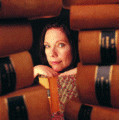
|
Can you give us a sneak peek of your next book release?
For all those folks who enjoy my futuristic romantic-suspense (written under my Jayne Castle name) I am happy to say that I just turned in a new manuscript to my editor. It features a starring role for Fuzz the dust-bunny.
More from Writers Write
Stephen King Quotes
quotes from the master
quotes from the master
Grammar Tips
improve your writing
improve your writing
Writing Prompts
spark your creativity
spark your creativity
